Go Lean Commentary
 What is the weather right now in Amsterdam, London, Paris and/or Washington DC?
What is the weather right now in Amsterdam, London, Paris and/or Washington DC?
Do you know? Does it even matter?
Chances are, the people in those cities also do not think of the specificities of our weather in the Caribbean. They might think it is warm in the winter and hot in the summer, but they may not understand the flooding-drought cycles, the humidity or the pervasive threat of tropical cyclones: Hurricanes.
They do not know … and may not care.
This is the alarming dangers of having Overseas Masters; they may not appreciate the need or landscape for local efficiencies in our daily stewardship. They may not care about the details and thusly, may not even allow the audience for us to enunciate the challenges of our problems or the solutions. They may even veto regulations and measures on our end that are best practices because they might violate some political “day-dream” on their end.
The concern may be trivial … or it may be life-or-death. This issue is just another scenario where there is a Long Train of Abuse for colonial pawns … compared to their imperial-host counterparts.
Here is an example of trivial:
Imagine this scenario …
… a Group Purchasing Agreement for Coast Guard boats is vetoed because a different manufacturer offers a better discount on their boats and snow removal equipment all bundled together.
This is our reality in the Caribbean. The need for us to deploy the best local governing strategy, tactic and implementation have never been greater, yet our hands may be tied for our own self-determination.
Now for an example approaching life-or-death. See this story below from Martinique in the French Caribbean. This is the grave matter of environmental poisoning, with a chemical not allowed in Metropolitan France but tolerated in the French Antilles. Grasp the summary from this excerpt:
“… the issue is how overseas territories get treated; there’s contempt, distance, condescension, lack of respect.”
Say it ain’t so!
See the full news article here, as published by the BBC:
Title: The Caribbean islands poisoned by a carcinogenic pesticide
By: Tim Whewell, BBC News, Martinique“First we were enslaved. Then we were poisoned.” That’s how many on Martinique see the history of their French Caribbean island that, to tourists, means sun, rum, and palm-fringed beaches. Slavery was abolished in 1848. But today the islanders are victims again – of a toxic pesticide called chlordecone that’s poisoned the soil and water and been linked to unusually high rates of prostate cancer.
“They never told us it was dangerous,” Ambroise Bertin says. “So people were working, because they wanted the money. We didn’t have any instructions about what was, and wasn’t, good. That’s why a lot of people are poisoned.” He’s talking about chlordecone, a chemical in the form of a white powder that plantation workers were told to put under banana trees, to protect them from insects.
Ambroise did that job for many years. Later, he got prostate cancer, a disease that is commoner on Martinique and its sister French island of Guadeloupe than anywhere else in the world. And scientists blame chlordecone, a persistent organic pollutant related to DDT. It was authorised for use in the French West Indies long after its harmful effects became widely known.
“They used to tell us: don’t eat or drink anything while you’re putting it down,” Ambroise, now 70, remembers. But that’s the only clue he and other workers in Martinique’s banana plantations in the 1970s, 80s and early 90s had about the possible danger. Few if any were told to wear gloves or masks. Now, many have suffered cancer and other illnesses.
Chlordecone is an endocrine disrupter, meaning it can affect hormonal systems.
One of the world’s leading experts on the chemical, Prof Luc Multigner, of Rennes University in France, says epidemiological studies have shown increased risk of premature births and increased risk of adverse brain development in children at the exposure levels people in Martinique and Guadeloupe face through contaminated food consumption.
He also says: “There is enough toxicological and experimental data to conclude that chlordecone is carcinogenic.”
Following a detailed study Prof Multigner and colleagues conducted on Guadeloupe in 2010, he estimates chlordecone is responsible for about 5-10% of prostate cancer cases in the French West Indies, amounting to between 50 to 100 new cases per year, out of a population of 800,000.
- Listen now online to Martinique: The poisoning of paradise
- You can also download the Crossing Continents podcast
Chlordecone stays in the soil for decades, possibly for centuries. So more than 20 years after the chemical ceased to be used, much of the land on Martinique cannot be used for growing vegetables, even though bananas and other fruit on trees are safe.
Rivers and coastal waters are also contaminated, which means many fishermen cannot work. And 92% of Martinicans have traces of chlordecone in their blood.
“You try to have a healthy kind of life. So maybe you will limit the effects of the poison. But you are not sure,” says historian Valy Edmond-Mariette, aged 31. “My friends and I were asking ourselves: do we really want children? Because if we give them breast milk, maybe they will have chlordecone in their blood. And I think nobody should be asking themselves this kind of question, because it’s awful.”
Production of chlordecone was stopped in the United States – where it was marketed as Kepone – as far back as 1975, after workers at a factory producing it in Virginia complained of uncontrollable shaking, blurred vision and sexual problems. In 1979, the World Health Organization classed the pesticide as potentially carcinogenic.
But in 1981 the French authorities authorised chlordecone for use in banana plantations in the French West Indies – and even though it was finally banned in 1990, growers lobbied for – and got – permission to carry on using stocks until 1993.
That’s why – for many Martinicans – chlordecone stirs up painful historical memories. “A lot of people talk about chlordecone like a new kind of slavery,” says Valy, whose own ancestors were enslaved. For two centuries, until 1848, Martinique was a colony that depended on the production of sugar by enslaved people. And in the late 20th Century, some of the big banana growers who used chlordecone were the direct descendants of those slave-owning sugar exporters, part of a small white minority known as the békés.
“Those are still the same group of people who have uncontested domination of the land,” says Guilaine Sabine, activist in a grassroots organisation called Zero Chlordecone Zero Poison. As well as campaigning for free blood tests for everyone on the island, members of the group have taken part in a new wave of protests over the last year aiming to draw attention to businesses that activists say have profited from the production and use of toxic pesticides. The demonstrations have been small, and some protesters have been convicted of violence against the police. But they reflect wider anger over the slow pace of France’s response to the chlordecone catastrophe.
It was only in 2018 – after more than 10 years of campaigning by French Caribbean politicians – that President Emmanuel Macron accepted the state’s responsibility for what he called “an environmental scandal”. He said France had suffered “collective blindness” over the issue. A law to create a compensation fund for agricultural workers has now been passed. But payouts haven’t started yet.
Martinique is an integral part of France, but one of the island’s MPs, Serge Letchimy, says it would never have taken the state so many years to react if there had been pollution on the same scale in Brittany, for example, or elsewhere in European France. “The issue is how overseas territories get treated. There’s contempt, distance, condescension, lack of respect.”
Prof Multigner says the original documents of the official body that authorised use of the pesticide in 1981 have disappeared for unknown reasons, hampering attempts to investigate how the decision was taken.
But the state’s representative on Martinique, Prefect Stanislas Cazelles, insists there was no discrimination against the islanders.
“The Republic is on the side of the oppressed, of the weakest here, just as in the European part of France,” he says.
The state is working to find ways to decontaminate the land – some scientists think chlordecone can potentially be biodegraded quite quickly – and ensure there is no trace of the pesticide in the food chain. And the prefect hopes the independent commission that will judge compensation claims will generally rule in favour of former farm workers who say they are victims of the pesticide.
Ambroise, who worked with chlordecone for so many years, had an operation to remove his cancer in 2015. But he still suffers from thyroid disease and other problems that may be connected to chlordecone’s known effects on the hormonal system.
Meanwhile the historian, Valy, had blood cancer when she was just 25. Her doctor does not think it was due to chlordecone. But Valy says no-one can be sure.
Worrying about the effects of the pesticide, she says, can be exhausting. “But in the end, you can’t control everything. You have to admit that to some extent, you’re poisoned, so you just deal with it.” 😐
Source: Posted November 20, 2020; Retrieved December 6, 2020 from: https://www.bbc.com/news/stories-54992051?fbclid=IwAR06kJWJa0snsL2On46rTiCpNKfxOFEhyF_G3uiyXKUk9Lpsp9hVMZjl60Q
This is not theoretical; this is the Long Train of Abuses we have had to endure here in the Caribbean.
This is the continuation of the monthly Teaching Series from the movement behind the 2013 book Go Lean…Caribbean. The book presents issues that are germane to Caribbean life and culture and how to address them: problems and solutions. For this month of December 2020, we are looking at the Long Train of Abuses that could-would-should move our people to change, to reform and transform. This is entry 2-of-6; this one asserts that a system of Overseas Masters is inherently flawed as a strategy for governance in a local community – “they” cannot see overseas.
- Too many things can go wrong.
- Too many things have gone wrong.
These “gone wrong’ considerations are among the lessons for this Teaching Series this month. See the full catalog of the series this month:
- Long Train of Abuses: Enough Already – Colonialism Be Gone!
- Long Train of Abuses: Overseas Masters – Cannot See Overseas
- Long Train of Abuses: Religious Leadership in Government – Reconciling Trump
- Long Train of Abuses: Religious Character in Society – Human Rights
- Long Train of Abuses: Dutch Hypocrisy – Liberal Amsterdam vs Conservative Antilles
- Long Train of Abuses: Puerto Rico – “Take the Heat” or “Get out of the Kitchen”
This submission looks specifically at an example in the French Antilles. But the foregoing example of French mis-management is just another case of “For Export Only”-labeled products. For stakeholders in the host country, their overseas territory is far enough to be considered for “exports”. This is why the Caribbean region must no longer endure these Long Train of Abuses.
The Go Lean book, serving as a roadmap for the introduction and implementation of the Caribbean Union Trade Federation (CU), asserts that Caribbean stakeholders must instantiate the technocratic security and governing apparatus to deliver in the Caribbean for the people of the Caribbean; for us by us. Our motivation is economic as well. Imagine our “trade” prospects.
In the foregoing news story, the threat on locally-grown produce was exposed because of the contaminating agents still in the soil in Martinique. Imagine a neighboring Caribbean island – i.e. Dominica – consuming fresh produce from Martinique. This is why any effort for a Caribbean Single Market must be coupled with a Security-Public-Safety apparatus as well.
Enough already! We do not want to be just an Export or Foreign Market. No, we want to be considered neighbors; we must protect each other.
We have addressed this theme before. Consider this sample of previous blog-commentaries that highlighted the roles and responsibilities to foster regional trade and regional harmony:
| https://goleancaribbean.com/blog/?p=19570 | European Role Model: Not when ‘Push’ comes to ‘Shove’ Under normal conditions, the EU boast Free Movement of people and universal protections of civil rights in every jurisdiction. But, now something has broken that European tranquility, the COVID-19 pandemic.The end-result may be closed borders, banned exports of critical supplies and withholding of humanitarian aid. That is “me first” nationalism, instead of the best-practice of interdependence. |
| https://goleancaribbean.com/blog/?p=18834 | A Lesson in History: Free Trade Agreement of the Americas Free Trade would allow for all 30 member-states to have a tariff-free trading environment. We need to consider this at least to fulfill our Food Security needs. |
| https://goleancaribbean.com/blog/?p=17282 | Way Forward – For Independence: Territory Realities A roadmap for a “bigger organization” tied to the geographical neighborhood, as opposed to the colonial legacy with “overseas masters” up to 8,000 miles away. |
| https://goleancaribbean.com/blog/?p=15567 | Caribbean Unity? Need French Antilles There must be a regional integration that will integrate the entire region. Yes, this effort posits that any integration without the French territories is like building a skyscraper on a shaky foundation. What a skyscraper really needs is: Bedrock, Baby! The Caribbean Union needs all French territories. |
| https://goleancaribbean.com/blog/?p=10554 | Welcoming the French in Formal Integration Efforts The islands of Martinique, Guadeloupe, Saint Martin and Saint Barthélemy want to do more with their tropical neighbors; they want to confederate, collaborate and convene on different issues related to community development and nation-building. The rest of the Caribbean should embrace this invitation. |
| https://goleancaribbean.com/blog/?p=10043 | Caribbean Integration Plan for Greater Prosperity Greater prosperity can be had in the Caribbean only by embracing regional integration. A new model of interdependence and regional integration is far better than the status quo. Like the African proverb says:”If you want to go fast, go alone. If you want to go far, go together”. |
“For export only” …
… just this label seems to be the catalyst for investigating the possibility of abuse. See this related story in this VIDEO here:
VIDEO – For Export Only – Pesticides (1981) – https://youtu.be/CPFLPGL_Lrg
Concord Media
Posted August 6, 2015 – Available to buy at: http://www.concordmedia.org.uk/produc… or buy or rent and watch now on: https://vimeo.com/ondemand/forexporto…The export of pesticides banned in the West, to third world countries, and the disastrous effects of this policy.
Made in 1981 this film reflects the cultural attitudes of the country and language of the time it was made. The issues raised are timeless. The film quality may not be to modern standards.
Distributed by Concord Media
Website: http://concordmedia.org.uk
Twitter: http://twitter.com/ConcordMedia
Facebook: http://www.facebook.com/ConcordMedia59
Vimeo: https://vimeo.com/concordmedia/vod_pages
In general, it is no longer acceptable for “imperial countries” to still own colonies – the inherent threats were manifested in World War I and World War II. In the post WWII reconciliations, it was frown upon to perpetuate colonial ecosystems. To navigate around such a Eliminate Colonies mandate, the Republic of France simply declared their Caribbean territories as a member-sub-state of France, an Overseas Department.
These initiatives proved to just be empty gestures …
So now, while “on paper” these 4 Caribbean islands (and French Guiana too) are supposed to be part of First World France, it is irrefutable that France treats them simply as Third World territories. For example, as depicted in the foregoing news story of shipping and tolerating dangerous chemicals that had previously been banned in Metropolitan France. 🙁
This is a continuation of the Long Train of Abuses.
So this is our urging for all Caribbean member-states of French heritage; (plus British, Dutch and American):
Get out … now!
We hereby urge all stakeholders to lean-in to an alternative, a better Way Forward, this Go Lean roadmap. This is our plan to make our regional homeland a better place to live, work and play.
Yes, we can. Yes, we must! 🙂
About the Book
The book Go Lean…Caribbean serves as a roadmap for the introduction and implementation of the technocratic Caribbean Union Trade Federation (CU), for the elevation of Caribbean society – for all member-states. This CU/Go Lean roadmap has these 3 prime directives:
- Optimization of the economic engines in order to grow the regional economy to $800 Billion & create 2.2 million new jobs.
- Establishment of a security apparatus to ensure public safety and protect the resultant economic engines.
- Improve Caribbean governance to support these engines, including a separation-of-powers between the member-states and CU federal agencies.
The Go Lean book provides 370-pages of turn-by-turn instructions on “how” to adopt new community ethos, plus the strategies, tactics, implementations and advocacies to execute so as to reboot, reform and transform the societal engines of Caribbean society.
Download the free e-Book of Go Lean … Caribbean – now!
Who We Are
The movement behind the Go Lean book – a non-partisan, apolitical, religiously-neutral Community Development Foundation chartered for the purpose of empowering and re-booting economic engines – stresses that reforming and transforming the Caribbean societal engines must be a regional pursuit. This was an early motivation for the roadmap, as pronounced in the opening Declaration of Interdependence (Pages 12 – 13):
x. Whereas we are surrounded and allied to nations of larger proportions in land mass, populations, and treasuries, elements in their societies may have ill-intent in their pursuits, at the expense of the safety and security of our citizens. We must therefore appoint “new guards” to ensure our public safety and threats against our society, both domestic and foreign. The Federation must employ the latest advances and best practices … to assuage continuous threats against public safety.
xi. Whereas all men are entitled to the benefits of good governance in a free society, “new guards” must be enacted to dissuade the emergence of incompetence, corruption, nepotism and cronyism at the peril of the people’s best interest. The Federation must guarantee the executions of a social contract between government and the governed.
xvi. Whereas security of our homeland is inextricably linked to prosperity of the homeland, the economic and security interest of the region needs to be aligned under the same governance. Since economic crimes, including piracy and other forms of terrorism, can imperil the functioning of the wheels of commerce for all the citizenry, the accedence of this Federation must equip the security apparatus with the tools and techniques for predictive and proactive interdictions.
xxiv. Whereas a free market economy can be induced and spurred for continuous progress, the Federation must install the controls to better manage aspects of the economy: jobs, inflation, savings rate, investments and other economic principles. Thereby attracting direct foreign investment because of the stability and vibrancy of our economy.
Sign the petition to lean-in for this roadmap for the Caribbean Union Trade Federation.

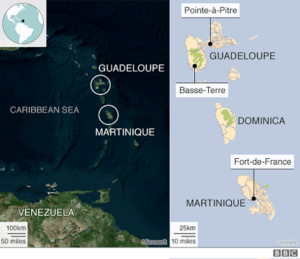



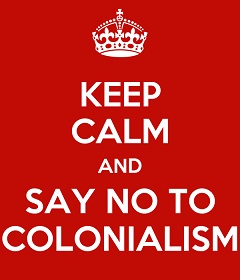


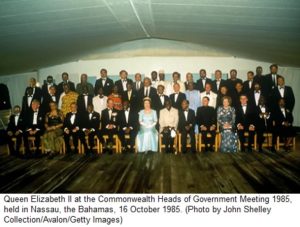 At one point, South Africa said “Enough Already”, as they
At one point, South Africa said “Enough Already”, as they  Notwithstanding indigenous Amerindian cultures, the Caribbean represents the oldest civilizations in the New World. Columbus made his New World discovery here in the Caribbean:
Notwithstanding indigenous Amerindian cultures, the Caribbean represents the oldest civilizations in the New World. Columbus made his New World discovery here in the Caribbean: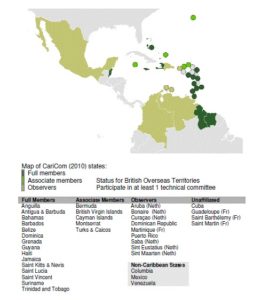

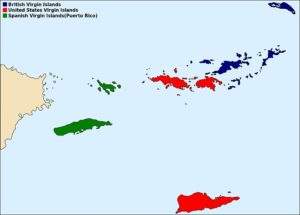
 … it is the assessment of this commentary that Independence is so overrated; rather than the independence, the call is for interdependence. A model of this desired interdependence is the inter-state cooperation in the European Union (EU).
… it is the assessment of this commentary that Independence is so overrated; rather than the independence, the call is for interdependence. A model of this desired interdependence is the inter-state cooperation in the European Union (EU).